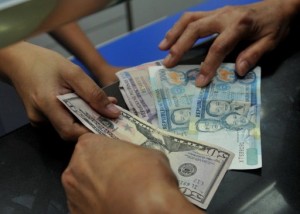Strong peso taking toll on exporters

TURNED OFF. Philippine exporters claim the strong peso have forced them to turn down foreign orders, as they said they would lose significantly.
Exporters all over the country are starting to turn away orders, lay off workers and even close shop as the strong peso has rendered them uncompetitive in the global market.
Sergio Ortiz-Luis Jr., president of the Philippine Exporters Confederation, said many exporters had no other choice but to refuse orders because acceptance would just result in significant losses.
In Malacañang, President Aquino said the exchange rate remained “tolerable.”
“P43 to P41 is the window. It’s still within the window of things we believe are tolerable,” Aquino told reporters in an interview.
“Exporters will complain. The importers are rejoicing and there should be positive effects especially with petroleum. For instance, [there should be] less pesos to ‘x’ number of barrels of oil,” Aquino added.
Article continues after this advertisementOrtiz-Luis said many exporters, especially the smaller ones, have chosen to scale down their operations or even completely shut down to cope with the situation.
Article continues after this advertisement“We had a big meeting [on Monday] and the exporters were up in arms. Many of them are refusing orders now for fear of higher losses. We’re trying to come up with suggestions on how to correct that,” Ortiz-Luis said in an interview Wednesday.
“We hope the [Bangko Sentral ng Pilipinas], in making policy, will be more inclined, more open-minded in terms of exports. The main culprit [for the very strong peso] is the BSP’s inflation targeting. The BSP should get over its fixation with low inflation as this isn’t really being felt by the housewives and the businesses,” Ortiz-Luis added.
What the BSP should consider, he said, were the 10 million overseas Filipino workers and two million exporters, each having at least five direct or indirect beneficiaries. Exporters also accounted for about 46 percent of gross domestic product while OFWs accounted for another 12 percent.
Instead of letting the peso run away like it has been doing these past months, Ortiz-Luis said the BSP should take a look at the number of people losing jobs due to the effects of the strong local currency.
Ortiz-Luis added that the BSP would do well not to listen too much to the projections of portfolio managers “who are just out to make money and have no concern for the country.”
“Of course, forex is affected by international factors, but it is always exacerbated by the decisions being made here. We’re so proud that hot money is flowing here, but it’s just being given away everywhere anyway. It’s because we can’t get foreign direct investments. We should not depend too much on portfolio managers,” Ortiz-Luis said.
Ortiz-Luis added that the BSP’s reasoning that the peso was just tracking all other currencies in the region was too close-minded as the situation in the Philippines was different from those in neighboring countries.
Local exporters, for example, had to deal with electricity rates that were double or triple those in neighboring countries. Costs of shipping and inputs here were likewise higher, he said.
“Here in the Philippines, we are already neck-deep in our costs. In Thailand, for example, maybe they’re just knee-deep, so the situation is really different. We have no more leeway,” Ortiz-Luis pointed out. “I think our mindset on inflation should be revisited. Also, our forex is not entirely market-driven. To a certain degree, it’s speculative. We should do something about that.”—With a report from Norman Bordadora